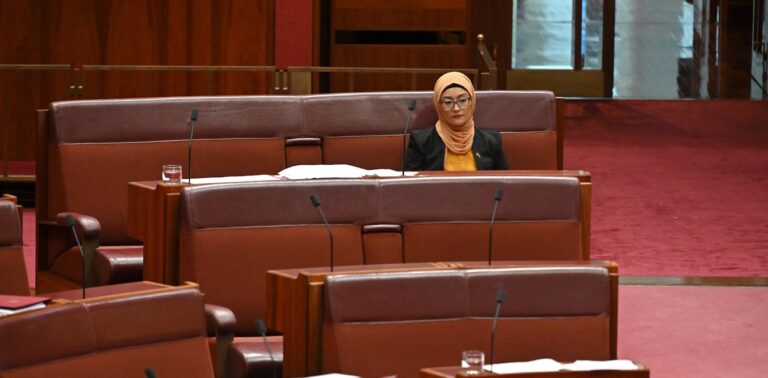Senator Fatima Peyman, who left the Labour Party last week to become an independent crossbench MP, said she would advise Muslims not to form their own political parties.
The Middle East conflict has led to a significant increase in Islamic activity, sparking speculation that an Islamic political party could be formed to contest seats in western and south-western Sydney and some Melbourne seats.
“I can’t speculate on what they may or may not plan to do, but what I can say is I don’t think it would be wise to have an Islamist political party,” Peyman told The Conversation politics podcast.
“So if I were to advise them, I would say don’t set up an Islamic party, because you need to look at a wider base of support.”
Although each state has a different demographic, he said, “I don’t think that’s going to have a positive impact on the way our democratic system works.”
While it is the right of those involved to decide whether to go down that path, “if I were to give advice to someone who wants to start a political party there; [I’d say] Think bigger. Think Australia as a whole.
“Think about how different we are compared to 30 years ago, and we continue to evolve into a melting pot of incredibly diverse cultures, identities and belief systems, and I think that’s just a beautiful thing.”
Last week Prime Minister Anthony Albanese issued a warning to religious parties. He said: “I […] “We don’t want Australia to go down the path of religious parties because that would weaken social cohesion.”
Peyman noted that religiously-based political parties have existed in the past and said an Islamist party would not pose a threat to social cohesion.
“People are free to do what they want, [set up] There are political parties that they want to set up, there are parties for fishermen, farmers and various other parties, so if people want to go down this path, it can be done.
“That’s a mistake. […] Not only do they politicize Islam, they also try to make it appear as though Islam threatens social cohesion and influences our political life.”
She said the key is educating communities about their right to vote, how to use it effectively and how to understand the political system.
“A lot of the multicultural communities out there come from countries where democratic methods of governance are not established or don’t exist, so voting is a very foreign concept to them. So education is paramount for these communities.”
“They have a right to voice their concerns, express their opinions and if they feel their elected officials or incumbents are not representing them well, they can use the election as a way to send a message to their local representatives.”
Mr Peyman said that if he were to start a political party – and he hasn’t ruled it out – “I wouldn’t start a Muslim-only party. I know the full scope of Western Australian electorates and I know I represent people from all walks of life.”
She said the genocide in Palestine “is not the only thing I’m focusing on, which is why it’s important for me to immerse myself in the whole Western Australian community and understand what matters to them”.
She was not going to play a major role in mobilising the Muslim vote in the upcoming elections.
“I don’t intend to do that, but I want to give more power and strength to the many communities who want their voices to be heard.”

